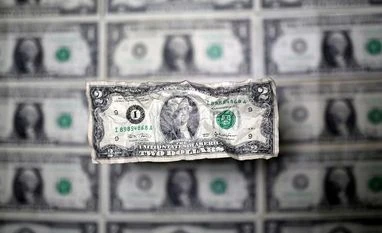Dollar off two-month peak, yuan gains on bond benchmark inclusion
The dollar index edged down to 94.313 <=USD>, after scaling a two-month high of 94.601 in Thursday's U.S session amid a bout of risk aversion
)
Photo: Reuters
By Hideyuki Sano
TOKYO (Reuters) - The U.S. dollar dipped from a two-month peak early on Friday as renewed hopes of U.S. stimulus eased investors' concerns about economic recovery, while the Chinese yuan gained after the country was added to a global bond benchmark.
The dollar index edged down to 94.313 <=USD>, after scaling a two-month high of 94.601 in Thursday's U.S session amid a bout of risk aversion.
Currencies and stocks reversed direction, with U.S. equities gaining as traders latched on to hopes that stalled stimulus talks could resume between House of Representatives Speaker Nancy Pelosi, a Democrat and U.S. Treasury Secretary Steven Mnuchin.
Democrats in the U.S. House of Representatives are working on a $2.2 trillion coronavirus stimulus package that could be voted on next week.
Also Read
The move came after the latest data showed the number of Americans filing new claims for unemployment benefits unexpectedly increased last week in a sign the economic recovery was running out of steam.
Many market players were cautious, however, as there remain doubts over whether the U.S. can overcome divisions to agree on a package.
U.S. political uncertainties are also keeping many investors on edge,with a disputed election becoming more likely after U.S. President Donald Trump refused to commit to a peaceful transfer of power if he lost the election.
"We have seen lately the dollar gaining as risk assets are sold off. We need to see whether this will continue beyond the end of this month," said Yukio Ishizuki, senior strategist at Daiwa Securities.
Rises in U.S. real yields have also underpinned the dollar. The yield on 10-year U.S. inflation-protected Treasuries rose to minus 0.911% >, the highest since late July.
The euro changed hands at $1.1671 > after having hit a two-month low of $1.16265 on Thursday.
The dollar was little moved at 105.41 yen >, having risen to 105.53, its strongest level in a over week, on Thursday.
The British pound managed to stay above Wednesday's two-month lows after Britain's government launched scaled-back job support for workers hit by a resurgent COVID-19 pandemic.
The offshore yuan gained, stemming its decline over the past week or so, after FTSE Russell announced it will add Chinese government bonds to its flagship World Government Bond Index (WGBI) starting in 2021.
"Foreign ownership of Chinese government bonds has picked up steadily. The inclusion in the WGBI benchmark will prompt additional foreign flows into the Chinese bond market and support the yuan," said Kevin Xie, China economist at the Commonwealth Bank in Sydney.
The Australian dollar traded at $0.7056 >, having hit a two-month low of $0.7016 overnight.
The Turkish lira maintained its firm tone following a jump from Thursday's record low after the country's central bank unexpectedly hiked interest rates by 200 basis points.
The lira last stood at 7.6200 per dollar >, more than 1% above its record low of 7.7170 set on Thursday.
(Reporting by Hideyuki Sano; editing by Richard Pullin)
(Only the headline and picture of this report may have been reworked by the Business Standard staff; the rest of the content is auto-generated from a syndicated feed.)
More From This Section
Don't miss the most important news and views of the day. Get them on our Telegram channel
First Published: Sep 25 2020 | 7:23 AM IST
